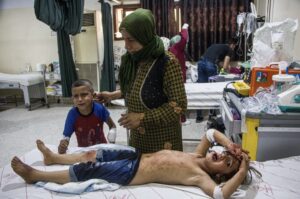A suicide bombing carried out by the ISIL (ISIS) armed group at an election rally in the border district of Bajaur, Pakistan, has left a devastating toll of 54 people dead and nearly 200 others injured. The attack targeted a gathering of about 400 members of the Jamiat Ulema-e-Islam (JUI-F) party, a key government coalition partner, who were waiting for speeches to begin. As funerals are held and the nation mourns the loss, the government has vowed to track down those responsible for the heinous act.
The Attack and Aftermath:
The suicide bomber, purportedly from the Islamic State, detonated his explosive vest in the middle of the crowd in the town of Khar, where the rally was being held. Despite efforts to rush the wounded to hospitals in Peshawar for treatment, the death toll continued to rise, and about 90 injured people were still under medical care in the northeastern province of Khyber Pakhtunkhwa. The chaotic scene at the rally was described by survivors as a loud blast that caused panic and confusion, resulting in a desperate scramble for safety.
ISIL Claims Responsibility:
The ISIL armed group claimed responsibility for the attack through its news arm Amaq, stating that a suicide attacker affiliated with ISIL carried out the heinous act. Authorities are investigating the incident and have recorded statements from some of the wounded to gain insight into the attack’s planning and execution.
Impact on Local Communities:
The devastating bombing has had a profound impact on the affected communities. Many injured individuals were taken to hospitals, and families mourned the loss of loved ones who fell victim to the attack. Some survivors recounted harrowing experiences of chaos and confusion immediately after the explosion. The attack has left scars on the minds of those present, further deepening the wounds caused by past acts of terrorism in the region.
Security Concerns and Political Context:
Bajaur, once a stronghold of the Pakistani Taliban, had experienced improved security conditions following military offensives that drove out the extremist group in 2016. However, the recent surge in militancy, marked by attacks like this one claimed by ISIL, has raised concerns about the need for multiple fronts to combat terrorism effectively. With upcoming parliamentary elections expected later in the year, politicians and citizens are increasingly concerned about security and stability.
The suicide bombing in Bajaur, Pakistan, has left the nation reeling from yet another tragedy caused by terrorism. The ISIL’s claim of responsibility adds to the complex security challenges faced by the country. As the government promises to bring the perpetrators to justice, the resilience of the Pakistani people and their determination to combat terrorism remain evident. The incident serves as a grim reminder that unity and vigilance are essential in confronting extremism and safeguarding the nation’s peace and stability.








